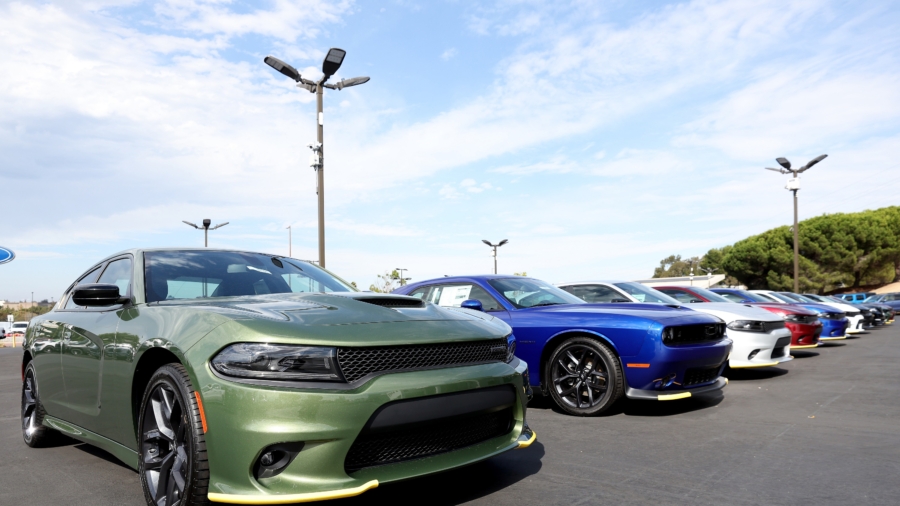Seventeen states follow California’s rigid vehicle emission requirements instead of federal standards, and now they’re considering following California’s lead in its gas-powered vehicle ban.
Indeed, Oregon said it’ll update its Advanced Clean Cars II law proposal to include a gas-powered vehicle ban in 2035.
And Washington said it would adopt a version of California’s rule by year’s end.
In Sep. 2021, New York Gov. Kathy Hochul (D) signed Senate Bill S2758, which effectively banned gas-powered vehicle sales by implementing a “zero-emission” in-state sales goal of 100 percent by 2035.
New York will likely institute an outright ban soon.
Further, other states have so-called trigger laws that require them to adopt the same emission regulations as California’s—even if they disagree with the requirements.

On Aug. 25, the California Air Resources Board voted to ban the sale of gas-powered cars entirely by 2035 — a move impacting seventeen states that follow California’s emission regulations.
New York, Massachusetts, Vermont, Maine, Pennsylvania, Connecticut, Rhode Island, Washington, Oregon, New Jersey, Maryland, Delaware, Colorado, Minnesota, Nevada, Virginia, and New Mexico have all chosen to opt into California’s standards instead of federal requirement.
Moreover, depending on the legalese of each state’s regulations, if California implements a specific condition, then the state tied to California’s standards must follow suit.
For example, under then-Gov. Ralph Northam (D), Virginia tied itself to California’s emission standards when it passed House Bill 1965, which directed Virginia’s State Air Pollution Control Board to “adopt and enforce” Section 177 of the Clean Air Act.

The Clean Air Act is a federal law requiring states to implement federal vehicle emissions standards or opt under Section 177 to follow California’s more stringent requirements.
Massachusetts, Washington, and Vermont have similar laws tying them to California.
On Aug. 11, Massachusetts Gov. Charlie Baker (R) signed House Bill 5060, which essentially dictated that if California passed a fossil-fuel vehicle ban, Massachusetts would follow suit.
In 2020, Washington passed Senate Bill 5811, which states, “The department of ecology shall adopt rules to implement the motor vehicle emission standards of the state of California including the zero emission vehicle program, and shall amend the rules from time to time, to maintain consistency with the California motor vehicle emission standards.”

Washington state’s law requires it to institute a gas-powered vehicle ban precisely like California’s—something Gov. Jay Inslee (D) supports and described as “a critical milestone in our climate fight.”
In 2018, Vermont updated its Air Pollution Control Regulations.
The regulations state, “No person, including a manufacturer or dealer, shall deliver for sale or lease … a 2000 or subsequent model-year passenger car or light-duty truck; or a 2004 or subsequent model-year medium-duty vehicle in Vermont unless the vehicle is California-certified criteria.”
The “California-certified criteria” include specific vehicle emission standards, meaning Vermont will follow California’s gas-powered vehicle ban.
In 2004, Gov. John Rowland (R-Conn) signed a law tying Connecticut to California. Still, the law allows for “wiggle room,” and officials hedged when asked if Connecticut would ban gas-powered vehicles.
“[California standards] won’t be enforceable here until we’ve actually gone through the process of updating our regulations but, yes we are required to do that as are a number of other states that have followed the California standards for a number of years,” said Shannon Laun, the director of the Conservation Law Foundation of Connecticut.
States Resisting Ban
Not every state tied to California’s emission requirements plans to follow the gas-powered ban, however. Plus, some states, like Virginia, are exploring legal options to resist it.
Colorado, for example, believes California’s ban is flawed and won’t adopt it—yet.
“While the governor shares the goal of rapidly moving towards electric vehicles, he is skeptical about requiring 100 percent of cars sold to be electric by a certain date as technology is rapidly changing,” the Colorado Energy Office told the AP.
And, on Aug. 30, Gov. Janet Mills (D-Maine) said she doesn’t support California’s ban, and Maine won’t follow suit.
“I would not be inclined to adopt any mandate along those lines. Make electric vehicles available, rebates available—but not a mandate,” Mills stated.
In a statement, New Jersey’s state Department of Environmental Protection spokesman Larry Hanja said that the agency is “committed to achieving the bold clean energy and emissions reduction goals set out by Gov. Murphy.”
He stopped short of saying when or if New Jersey would begin adopting California’s law.

Other states like Delaware, New Mexico, Pennsylvania, Maryland, and Nevada have regulations requiring a certain percentage of vehicles sold to be “zero-emission” by a specific date. Nevertheless, their laws don’t cede power to California.
However, earlier this year, Rhode Island introduced House Bill 7653 and Senate Bill 2448, which were similar to Washington’s law—both measures were “held for further study.” Thus, Rhode Island is not yet required to ban gas-powered vehicles.
The laws in Minnesota are a bit murkier.
In 2020, Minnesota adopted “Clean Car” standards that tie Minnesota to California. However, the Minnesota Auto Dealers Association (MADA) filed a complaint with the State Court of Appeals, arguing that the law improperly delegates the state’s authority to the California Air Resources Board.
“There’s a state law that says one agency can’t write rules for another agency, in this case the agency writing the rules for the MPCA is the California Air Resources Board,” stated MADA president Scott Lambert.
The lawsuit is pending.
Minnesota isn’t the only state with a coalition fighting against instituting a gas-powered vehicle ban.
As stated above, Virginia’s emissions laws went into effect under the previous Northam administration.
Virginia’s new Governor Glenn Youngkin (R) publicly said he views the law as “ludicrous” and vowed to challenge the law.
From The Epoch Times

